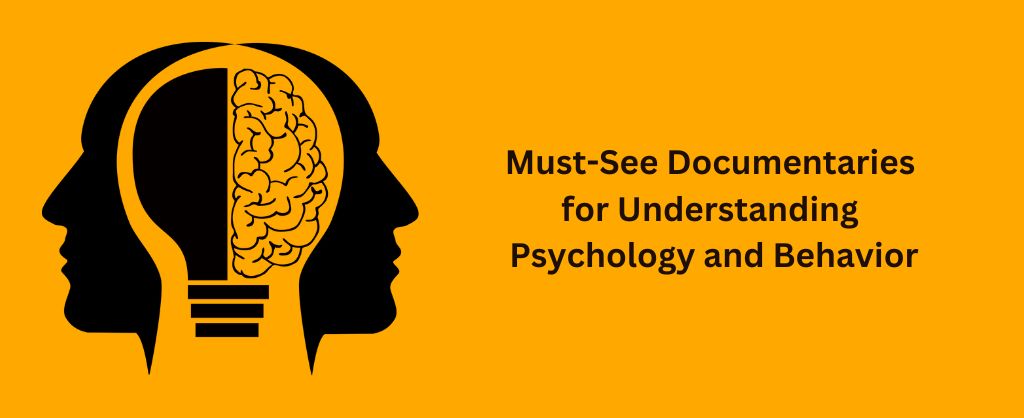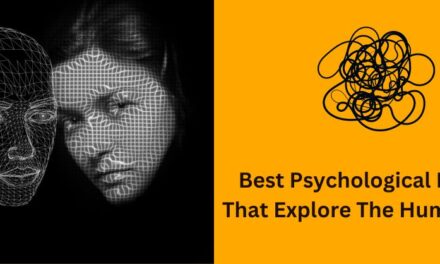Top 10 Documentaries About Psychology and Human Behavior

Psychology and human behavior are fascinating subjects that have inspired many compelling documentaries over the years. These documentaries provide insightful looks into various aspects of the human mind and our social interactions.
From illuminating studies on human morality to emotional examinations of mental illness, documentaries have proven to be an excellent format for exploring the complexity of psychology.
Content
- Introduction
- The Stanford Prison Experiment
- The Brain with David Eagleman
- Three Identical Strangers
- A Dangerous Method
- My Love Affair with the Brain
- Autism: The Musical
- Capturing the Friedmans
- Crumb
- Stress: Portrait of a Killer
- Marwencol
- Conclusion
Introduction
In this article, I highlights ten of the most intriguing and enlightening documentaries ever made about psychology and human behavior. The films on this list take deep dives into key figures and events that shaped psychology, the inner workings of the mind, impactful social experiments, and more.
Read on for an overview of each film and what makes it a must-watch for anyone interested in better understanding the human experience.
The Stanford Prison Experiment (2015)
In 1971, psychologist Philip Zimbardo conducted a controversial experiment at Stanford University that continues to resonate today.
The Stanford Prison Experiment aimed to study the psychological impacts of perceived power by assigning 24 male college students to be either “prisoners” or “guards” in a mock prison built in the basement of the psychology department. The experiment quickly spiraled out of control, revealing disturbing truths about human behavior that Zimbardo himself did not expect.
The 2015 film adaptation of the Stanford Prison Experiment dramatizes this infamous study while analyzing the ethical questions it raised. Director Kyle Patrick Alvarez takes care to accurately portray the events as they transpired, lending an air of palpable realism to the escalating displays of cruelty and humiliation.
Thoughtful and gripping, The Stanford Prison Experiment will leave viewers pondering the fine line between brutality and obedience.
The Brain with David Eagleman (2015)
Neuroscientist David Eagleman hosts the fascinating 6-hour series The Brain with David Eagleman examining how the brain shapes our realities. Blending scientific research with imaginative storytelling, the show illuminates the neural processes behind everything from synesthesia to facial recognition to dreamed memories.
Eagleman and experts in various fields perform experiments that demonstrate just how subjective perception, time, and consciousness all depend on specific brain mechanisms.
The Brain covers broad cognitive phenomena but also ventures into individual people’s unique brains, from autistic savants to a man with extensive brain damage to a woman who feels no fear. High-tech props, vivid metaphors, and cinematic reenactments help demystify the brain’s complications.
Eagleman’s contagious curiosity invites audiences to fundamentally rethink their relationship to their own minds. Entertaining yet highly educational, The Brain provides an accessible entry point into unraveling the brain’s astonishing complexities.
Watch Episode 1: What is Reality
Three Identical Strangers (2018)
In 1980, three young men discovered they were identical triplets separated at birth and adopted by different families. The joyful reunion between the 19-year-olds quickly evolved into a quest for answers about their mysterious origins and separation.
The 2018 documentary Three Identical Strangers traces the unbelievable story of Bobby Shafran, David Kellman, and Eddy Galland through interviews with the triplets themselves. As the brothers dig into their adoption agency’s questionable motives, a disturbing nature vs. nurture experiment comes to light.
Director Tim Wardle deftly balances the twins’ touching brotherly bond with troubling revelations about their childhoods as unmonitored research subjects. Equally joyful and unsettling, Three Identical Strangers offers a compelling exploration of free will through the lens of an unethical psychology experiment with three unaware participants.
A Dangerous Method (2011)
Directed by David Cronenberg, A Dangerous Method charts the early days of psychiatry through the complex relationships between Carl Jung, Sigmund Freud, and Sabina Spielrein. These three psychoanalytical pioneers engaged in a psychological triangle that influenced their radical ideas, particularly on sexuality, repression, and the unconscious mind.
Viggo Mortensen, Michael Fassbender, and Keira Knightley respectively portray Freud, Jung, and Spielrein, conveying the egos and insecurities behind their professional work. Their intellectual and emotional entanglements raise provocative questions about the subjective nature of the analytic process.
With elegant direction and riveting central performances, A Dangerous Method brings viewers inside the genesis of psychoanalysis during a historic turning point in the field.
My Love Affair with the Brain: The Life and Science of Dr. Marian Diamond (2016)
Dr. Marian Diamond was a pioneering neuroscientist who made groundbreaking discoveries about brain plasticity and enrichment. The 2016 biopic My Love Affair with the Brain chronicles her scientific journey from academia’s male-dominated trenches to international prominence in the anatomical study of the brain.
Director Catherine Ryan and narrator Susan Sarandon pay tribute to Diamond’s research on environmental impacts on the brain, from social relationships to physical exercise. Dramatized scenes from Diamond’s student days highlight the challenges she faced as a woman in science while showcasing her determination and ingenuity.
With touching interviews and footage of Diamond’s talks, the documentary celebrates the compassion and curiosity that fueled her work. My Love Affair with the Brain honors Diamond’s contributions to the field of neuroscience, including proving Einstein’s brain was no bigger than average.
Most importantly, it highlights her mission to spread knowledge empowering people to maximize their cognitive health and abilities.
Autism: The Musical (2007)
Autism: The Musical follows five autistic children as they write and perform their own live musical production. Filmmaker Tricia Regan captures the many challenges and breakthrough moments the cast faces during rehearsals. Their creative process provides a glimpse into the thoughts, emotions, and capabilities of children living with autism.
Regan intimately documents the performers’ struggles with social cues, motor skills, and sensory sensitivity. But the documentary also highlights their joy and perseverance in pursuing new skills and friendships.
Autism: The Musical is a poignant celebration of the cast’s hard-won accomplishments on stage and personal growth behind the scenes. Above all, it emphasizes the humanity and individuality behind autism diagnoses.
Capturing the Friedmans (2003)
The Friedmans seemed like an average middle-class Jewish family in 1980s Long Island before patriarch Arnold and youngest son Jesse were arrested on shocking charges of child sexual abuse. The Oscar-nominated documentary Capturing the Friedmans takes viewers inside the family’s implosion as the devastating allegations come to light.
Interviews with Jesse Friedman and his mother, home videos from before and during the police investigations, and candid archive footage provide an intimate yet ambiguous picture of a family in crisis.
Director Andrew Jarecki weaves a nuanced depiction of the legal battle and media frenzy surrounding the high-profile case. He also explores broader themes of family dysfunction, inherited trauma, and the flaws of the criminal justice system.
Jarecki refuses easy answers, instead constructing a thoughtful portrayal of how one horrific scandal affected an entire family. Deeply unsettling yet remarkably empathetic, Capturing the Friedmans remains an enigmatic exploration of psychological downfall.
Crumb (1994)
Renowned underground comic book artist Robert Crumb rose to prominence in the 1960s counterculture scene with his subversive, sexually provocative illustrations. The documentary Crumb uses interviews and art analysis to probe the psychology and dysfunctional family dynamics that shaped his body of work.
Director Terry Zwigoff intersperses Crumb’s own drawings and writings with discussions about his troubled upbringing, sexual hang-ups, and flirtations with mental illness.
Crumb examines both the taboo-breaking nature of the artist’s output as well as his psychological motivations behind such extreme imagery. Through this documentary’s intimate profile, Crumb emerges as a damaged and self-loathing man using his art to exorcise personal demons. Crumb ultimately highlights how even counterculture icons cannot escape the impact of childhood.
Crumb is also one of the favourite documentaries of Dr. Jordan Peterson, a renowned Pshycologist.
Stress: Portrait of a Killer (2008)
This National Geographic documentary examines the nature of stress on the human mind and body. Stanford neurobiologist Robert Sapolsky travels across the globe, interviewing experts and visiting diverse communities to learn how prolonged stress can literally change brain chemistry and cause life-threatening conditions. Case studies presented include impoverished residents of post-apartheid South Africa as well as high-achieving American students.
Sapolsky analyzes populations managing constant stress factors like poverty, discrimination, and reduced autonomy. The effects range from anxiety disorders to PTSD to cardiovascular disease.
Stress: Portrait of a Killer compellingly visualizes how chronic stress alters brain structure and influences behavior. Sapolsky argues proactively managing stress, whether through therapy, lifestyle changes, or societal reform, can prove critical to public health.
Watch the full documentary below:
Marwencol (2010)
After a brutal beating outside a bar left him with brain damage and memory loss, artist Mark Hogancamp began constructing intricate miniature WWII scenes featuring dolls as a form of therapy.
The documentary Marwencol explores Hogancamp’s unique psychological journey to recovery through the fictional village of Marwencol he photographed and brought to life. Director Jeff Malmberg reveals how Hogancamp created and controlled an elaborate fantasy world in order to process trauma.
Through in-depth interviews and fly-on-the-wall footage, Malmberg paints a touching portrait of a creative mind rebuilding itself. Hogancamp’s friendships with fellow artists and a growing public appreciation of his work also aid in his healing process.
Marwencol demonstrates the restorative power of imagination and human connection in overcoming hardship. Above all, the film highlights art’s ability to make sense of inner darkness.
Conclusion
The human mind is infinitely complex, which makes analyzing psychology and behavior both challenging and fascinating. Documentaries provide the perfect avenue for comprehensively investigating complicated mental processes and social dynamics.
The ten films discussed in this article all expand perspectives on different aspects of psychology ranging from pivotal studies to therapeutic benefits of creativity.
While dramatic narratives tend to sensationalize psychology, documentaries take more nuanced approaches to illuminate why people think and act in certain ways. The immersive storytelling draws audiences into even disturbing subject matter, inviting them to ask hard questions about human nature.
Moving forward, documentaries will continue offering insightful windows into the psychological underpinnings behind our behaviors, relationships, and societies.









